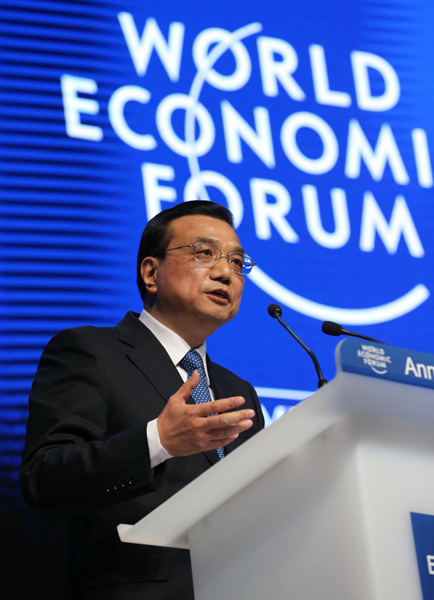Li's Davos speech draws praise
By Ji Tao, Fu Jing and Zhang Chunyan in Davos, Switzerland (chinadaily.com.cn) Updated: 2015-01-23 00:25
 |
|
Chinese Premier Li Keqiang delivers a keynote speech at the World Economic Forum (WEF) annual meeting in Davos, Switzerland, on Wednesday. [Photo / Xinhua] |
Global business leaders and analysts comment on Premier Li Keqiang's keynote speech at the World Economic Forum annual meeting on Wednesday.
Peter Maurer, president of the International Committee of the Red Cross
It resonates a lot when the Chinese premier mentions how important the (global) environment is for growing and sustainable economy. It's something which we relate a lot with the Chinese authority, and we had excellent cooperation with China on that message, so I think it's very encouraging.
The second thing I extremely appreciate is the tone of realism, and sort of like Eurasianist statement, in his speech. It came to me as a strong message that we know who we are, where we are, where we will go, maybe there will be some difficulties. So he didn't make a promise to the world which cannot be fulfilled. But it seems to me he is not under-ambitious either. So he has a vision, but it's a realistic vision.
Nariman Behravesh, chief economist of IHS, a consulting firm based in Switzerland
Premier Li clearly is a trained economist and he spoke in a way that I think really reached out to this audience. They want to know some specifics, for example, what are China's goals, how it's going to get there. He raised a number of issues. He talked about integration, free trade and sustainable growth rate, very important for this audience. He talked about China willing to trade off a little bit of growth for the focus on reforms, again very important.
He spoke with energy, with passion. I think it's important for Premier to talk about geopolitics and terrorism at the very beginning. These are crucial aspects that these delegates are worried about. They worry about economy but unfortunately the two issues are intruding as they were so we have to deal with them. So I think it's right for him to focus on that first.
Karel Lannoo, executive director of Brussels-based think tank Centre for European Policy Studies
China's role is very important, for Europe, the US and the rest of the world. My confidence would be based on the fact that in the past 20 years, China has managed it well, and it has the necessary buffers to stimulate the economy.
Flemming Christiansen, professor and chair of political sociology at University of Duisburg-Essen in Germany
I have followed China's development as a keen observer since it started in 1978, and I think Premier Li is right to say that the initial rural reforms (1978-1983) represented a first example of what is still at the center of the efforts to develop China's political economy: unleashing the force of mass entrepreneurship and innovation using what he calls the "laws of the economy" and maintaining a firm guiding and facilitating role of the government.
David Fouquet, senior associate at European Institute of Asia Studies in Brussels
The world is wondering if China can remain the engine of growth if it slows down. To my mind there is still considerable growth potential, but it also depends on how the markets respond and whether China continues to import and invest outward.




